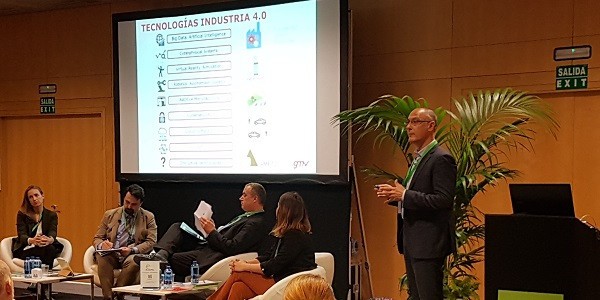Generating new business models for connected industry

The new technological trends represent a genuine revolution in the digital economy. We are dealing here with a whole new economic, social and technological paradigm that obliges our sectors to reinvent themselves to suit. Innovation and new technologies (internet of things, augmented reality, artificial intelligence, collaborative robotics, etc) are all key factors in boosting energy efficiency and sustainability, representing one of the European Union’s stiffest challenges. Spain now boasts marquee projects at worldwide level in this area.
In this context, at the Smart Energy Congress, an event organized by plataforma enerTIC, GMV has showcased its enabling-technology adaptation prowess to help boost energy efficiency and competitiveness, plus the application of groundbreaking solutions for the optimization and management of industrial processes.
GMV’s has played an active part in this congress, presenting two papers: "Artificial Intelligence Opportunities and Trends" by Miguel Hormigo, Manager of GMV’s Secure e-Solutions Sector; and "Optimization of industrial processes with the Industrial Internet of Things (IIoT) and Big Data" by Pedro José Hernández Ariznavarreta, Business Partner and expert in Industry Digitalization.
Hernández Ariznavarreta’s speech stressed GMV’s wealth of experience in platforms based on Big Data, IIoT and Machine Learning in order to boost energy efficiency and the reliability of industrial-plant assets. “GMV boasts all the necessary technology for helping its clients in the digital transformation strategy, with the aim of optimizing their manufacturing and maintenance processes. GMV uses the right statistical tools and models to analyze huge amounts of data, enabling the use of interrelated variables with the purpose of monitoring industrial processes and detecting any faults early” he argued.
Hormigo’s paper was also integrated in the panel discussion on Industry 4.0 Innovation, Opportunities and Trends. This debating panel was moderated by César Franco, Dean of the Professional Association of Industrial Engineers of Madrid (Colegio Oficial de Ingenieros Industriales de Madrid: COIIM), who soon homed in on one of the country’s biggest problems: "industry accounts for 30% of the country’s energy consumption.... we have to change our way of doing things on the strength of digitalization".
In the words of Miguel Hormigo, there are 4 crucial technologies for driving the digital transformation: Cybersecurity, the Internet of Things, Cloud Computing and Artificial Intelligence. First and foremost comes cybersecurity, a mature market whose main benefit has to do with a high level of competitiveness and client demands. For its part, the internet of things has become a kingpin of digitalization; the number of connected devices is continually increasing, giving rise to disruptive business models with techniques for compiling, analyzing and processing in real time the huge amount of data generated nowadays. Cloud Computing, in turn, represents a qualitative leap, enabling us to procure services online, using resources at exactly the right time and no other. Last but not least he took up the theme of artificial intelligence, stressing the market opportunities and initiatives that exist today and the part being played by GMV in realizing them: healthcare, autonomous vehicles, smart cities, smart factories and client service.
"Artificial intelligence is going to bring in a sweeping change"
As regards artificial intelligence’s impact on the world, Hormigo pointed out that machine learning chalked up an annual growth rate of 34% a year from 2013 to 2017. This business is set to grow from 12 billion dollars to 57 billion by 2021 (according to IDC figures).
Artificial intelligence is taken up and adapted above all by sectors like financial services and telecommunications, using process-automating IT apps to boost operational efficiency. Other sectors with a lower demand as yet are nonetheless eyeing up the opportunities it offers, such as the automotive, logistics and energy industries, while others have hardly taken it up at all like tourism and education.
From all this we can safely conclude that investment and collaboration in research and development is now bearing fruit. There now coexist several groundbreaking trends and algorithms capable of simulating, forecasting and achieving smart, client-centered solutions to clear up complex problems. Miguel Hormigo wound up with the resounding claim that “Artificial intelligence is going to bring in a sweeping change".